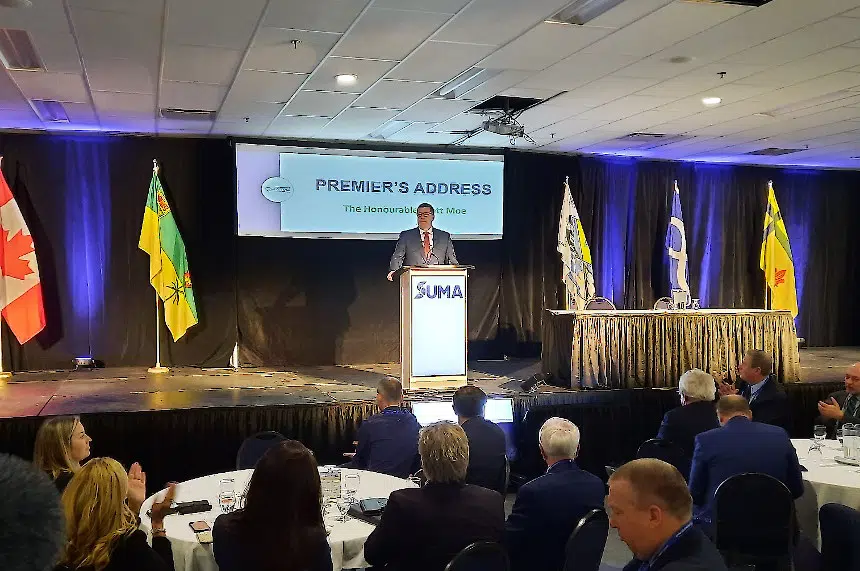The resolutions up for discussion at this year’s Saskatchewan Urban Municipalities Association (SUMA) convention ran the gamut from pushing for the federal government to pay for the RCMP’s retroactive salary increases to advocating for public sector accounting changes — and all were passed Monday afternoon.
This marks the first in-person SUMA convention in two years. Randy Goulden, the interim SUMA president, said it has been a difficult couple of years.
“To get together and hear the buzz in the room and, personally for me, when I walked into the opening ceremonies and seeing our delegates and seeing them chatting and visiting, it was very, very emotional,” said Goulden.
Goulden talked about opening up committees on Sunday for the first time and asking members to talk to them about what they’re hearing in their communities. She said they heard a lot about mental health and addictions.
“We’re appreciative of the 150 (addictions treatment) beds that are going to be added … but that’s at the treatment level. Our members want to see proactive work before we get to the crisis system because that is the most costly to treat and to turn around,” explained Goulden.
One of the resolutions, which passed with no discussion, was a resolution to advocate for the provincial government to provide “leadership” to break the cycle of mental health, addictions and homelessness issues by “co-ordinating provincial ministries, police services, community agencies, and Indigenous organizations and government, in order to ensure effective evidence-based responses that address all of these issues.”
The resolution also asked for SUMA to push the provincial government to increase funding for those issues to help address “this growing crisis.”
Goulden said these things were issues before the pandemic, but they have got worse.
“It has amplified it to a crisis proportion now,” said Goulden.
In the dialogues on Sunday, Goulden said health care was also a huge concern, but there were some interesting ideas for more rural areas like bringing in more nurse practitioners, locums and travelling doctors.
Goulden was certain health care would be brought up in the bear pit session Wednesday, where delegates can question the premier and his cabinet.
“We’re interested to see what our cabinet and our premier will be saying about that because there are huge concerns — there are concerns that our residents cannot get treatment (with long) waiting lists to see doctors,” said Goulden.
Another resolution that was passed on Monday was one talking about health-care recruitment and retention, which stated the health authority “does not allocate sufficient resources towards recruiting and retaining RNs and LPNs.”
The resolution called for SUMA to advocate for the immediate development of long-term recruitment and retention plans for health care across the province.
“We’re pleased that Regina and Saskatoon and Prince Albert are getting upgrades and getting new facilities but there are 440 of those urban communities in our province and we would like to see fair and equitable treatment for all of them,” Goulden said beforehand.
Only a couple of resolutions saw any amendments and most were passed without any discussion at all. The amendment around adequate funding for public libraries did see a few comments, and the resolution which advocates for a 40-kilometre-per-hour speed limit when passing emergency vehicles saw a couple of comments as well, but both passed fairly comfortably.
Here is this year’s resolutions PDF.











